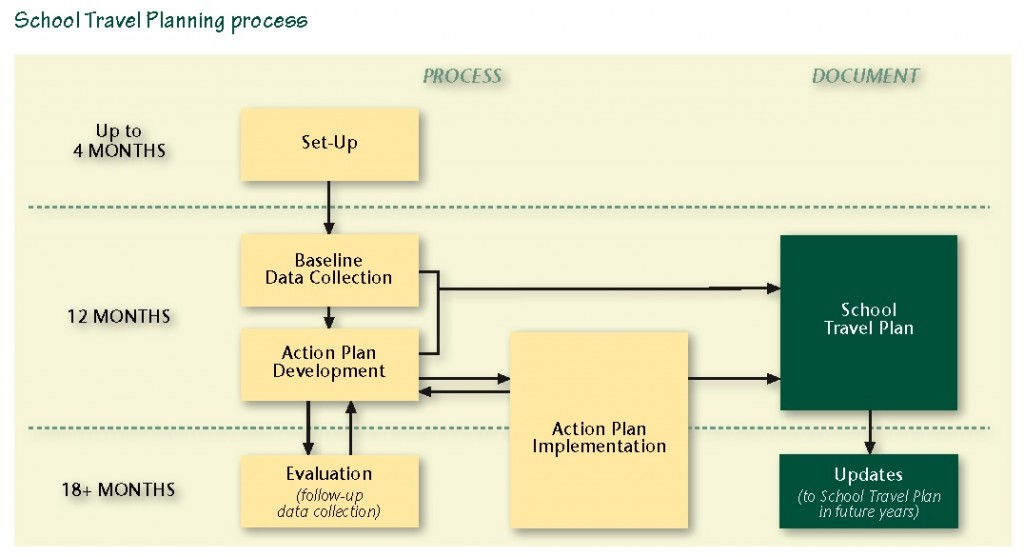What is School Travel Planning?
A School Travel Plan is a living document that belongs to the school. It is created using a process that involves collecting information to identify how students are getting to and from school and what barriers exist for students to walk, bike or use other forms of active and sustainable transportation to school. From this information a group of people from the school and community organizations work together to develop an action plan to reduce some of these barriers for families and children.
Image source: Green Communities Canada
Why does the WRDSB support School Travel Planning?
In 2011, the Waterloo Region District School Board passed an Active Transportation Charter. The Charter listed the development of School Travel Plans for every school as a means to create an environment in all parts of the Region that encourages and supports active modes of travel.
By supporting active transportation, schools:
- Encourage children to gain independence;
- Improve student achievement and health through increased Daily Physical Activity;
- Reduce traffic congestion around school sites;
- Reduce the environmental impact of school-related travel;
- Improve the quality of life for all school community members;
- Build lifelong healthy habits by normalizing walking/biking as part of a child/family’s lifestyle (healthier kids = healthier adults).
For additional information about the benefits of School Travel Planning, see “Why School Travel Planning In Waterloo Region?”
School Travel Planning in WRDSB Schools
Along with Student Transportation Services of Waterloo Region, the cities of Cambridge, Kitchener and Waterloo, and the Waterloo Catholic District School Board, we are partners in regional school travel planning. If you want more information about school travel planning in WRDSB schools, please contact:
Leslie Maxwell, School Travel Planner
2015 School Travel Plan Data Collection Summaries:
- Manchester Public School, Cambridge
- Millen Woods Public School, Waterloo
- Silverheights Public School, Cambridge
- Waterloo Region School Travel Planning, 2015 Project Summary
How effective are School Travel Planning interventions?
An evaluation of school travel plans published by Mammen, Stone, Buliung & Faulkner (2014) found that 17% of parents reported driving their children to/from school less often as a result of the school travel planning intervention. Of those parents who reported driving less, the large majority (83%) had switched to active transportation, thus highlighting the potential of school travel planning interventions to increase active transportation in parents and their children.
How are our local municipalities supporting School Travel Planning?
Here are a just a few ways our local partners are helping support School Travel Planning initiatives:
- City of Cambridge
- Report 15-041 (TPW): School Travel Planning Policy, Adopted October 20, 2015
- City of Kitchener
- Report INS-15-097: School Zone Traffic and Parking Issues, December 7, 2015
- City of Waterloo
- School Wayfinding Project Process Evaluation
- Healthy Kids Community Challenge: Funding an expansion of the School Wayfinding Project
- Region of Waterloo
- 2015-2018 Strategic Plan: 2.3.2 Collaborate with community partners to facilitate actions to encourage active and safe routes to school.
- Resource webpages
Tags: Active & Safe Routes to School · Active Transportation Charter · School Travel Plan

